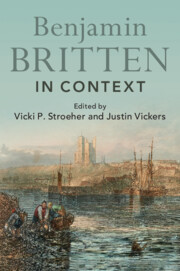Book contents
- Benjamin Britten in Context
- Composers in Context
- Benjamin Britten in Context
- Copyright page
- Dedication
- Contents
- Figures
- Tables
- Notes on Contributors
- Acknowledgements
- Bibliographic and In-Text Abbreviations
- Prologue
- Part I The Britten Circle(s)
- Part II British Musical Life
- Part III Britten and Other Composers
- Chapter 17 The Compositional Context
- Chapter 18 Responding to a British Musical Past
- Chapter 19 Britten and the English Musical Renaissance
- Chapter 20 Responding to the Continent
- Chapter 21 An English Tradition?
- Chapter 22 ‘An Exciting Time with All the Russians’
- Chapter 23 The Avant-Garde
- Part IV Wordsmiths, Designers, and Performers
- Part V British Sociocultural, Religious, and Political Life
- Further Reading
- Index
Chapter 20 - Responding to the Continent
from Part III - Britten and Other Composers
Published online by Cambridge University Press: 31 March 2022
- Benjamin Britten in Context
- Composers in Context
- Benjamin Britten in Context
- Copyright page
- Dedication
- Contents
- Figures
- Tables
- Notes on Contributors
- Acknowledgements
- Bibliographic and In-Text Abbreviations
- Prologue
- Part I The Britten Circle(s)
- Part II British Musical Life
- Part III Britten and Other Composers
- Chapter 17 The Compositional Context
- Chapter 18 Responding to a British Musical Past
- Chapter 19 Britten and the English Musical Renaissance
- Chapter 20 Responding to the Continent
- Chapter 21 An English Tradition?
- Chapter 22 ‘An Exciting Time with All the Russians’
- Chapter 23 The Avant-Garde
- Part IV Wordsmiths, Designers, and Performers
- Part V British Sociocultural, Religious, and Political Life
- Further Reading
- Index
Summary
From the early nineteenth century through the middle of the twentieth, Britons were in thrall to German composers. In 1940, music editor Ralph Hill complained of ‘the fanatical worship of the public as well as the average professional musician for the German tradition’. Instead of any unified Austro-German tradition, this was Britain negotiating a changing set of stylistic currents, played off against other continental identities and shifting ideas of old and new. Before the First World War, British musicians considered Austrians and Germans wardens of traditional styles (Brahms) as well as promulgators of modernism (Strauss and Schoenberg). British composers after Elgar, among them Holst and Vaughan Williams, responded directly to French exemplars and to the emerging folk revival. With Britten and other British composers of the 1930s, there was a marked shift of allegiance away from the musical ‘Hun’ – apart from an increasing interest in Mahler. By the later 1950s, ‘The Hun’ had ceased to be an entity for UK music lovers. Indeed, the Britain-vs.-the-continent duality was already moribund when the young Manchester group brought homegrown rather than continental modernism to London in 1956.
Keywords
- Type
- Chapter
- Information
- Benjamin Britten in Context , pp. 171 - 179Publisher: Cambridge University PressPrint publication year: 2022



